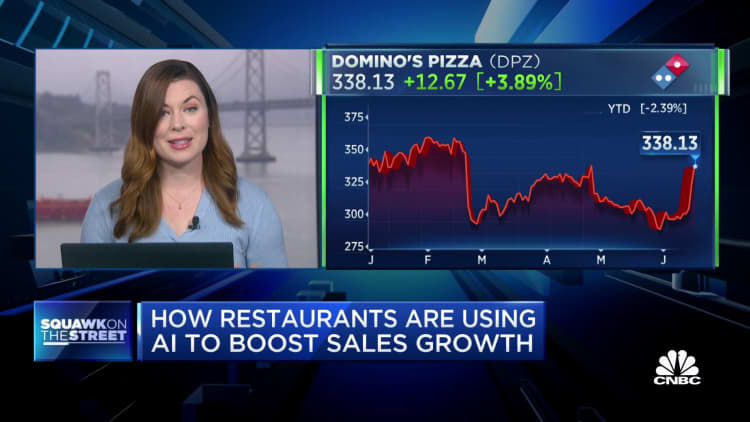
From drive-thru to back-of-house operations to predictive ordering for consumers, restaurant brands are starting to pilot artificial intelligence to streamline food service.
The technology has yet to reach critical mass at major chains but has the potential to automate more tasks and give restaurant workers the opportunity to have a more meaningful experience with guests.
Analysts say a key benefit is the potential to ease workforce challenges in an ongoing tight hiring market. The National Restaurant Association predicts the industry will add 500,000 jobs by the end of 2023, but notes there’s currently just one job seeker for every two open positions.
What’s more, TD Cowen estimates voice-enabled AI can drive sales as much as 15% through suggestive selling as well as speed up service times by 10 seconds.
The industry shift is reminiscent of the emergence of third-party delivery services five years ago, before it was ubiquitous at nearly every major restaurant operator, according to Andrew Charles, managing director of consumer and restaurants at TD Cowen.
“Some were trying it, others we’re contemplating it, most were piloting it,” he said of third-party apps for delivery services. “I think there’s a clear analogue to today where it’s very similar and as we continue to see further adoption of this, you will see a domino effect here.”
But there are still hurdles to broad adoption, according to Charles. Many of these large restaurant chains need to get franchisees on board. Language barriers and menu nuances can add complexity to the ordering process that AI may not be able to navigate.
Meanwhile, the wave of pilot programs has already begun.
Last month, Carl’s Jr. and Hardee’s parent company CKE announced it was aiming to launch AI integrations nationwide via partnerships with Presto and OpenCity AI.
Yum! Brands in recent years has been a leader in leveraging AI to enhance operations, including its 2021 acquisition of Dragontail aimed at streamlining food prep and delivery. The tech, which automates kitchen flow, driver dispatch and customer order tracking, is used in 1,000 Pizza Hut locations in the U.S., and nearly 3,000 more globally. The company also relies on AI for its recommended ordering module that informs managers of how much product to order weekly.
McDonald’s, for its part, sold McD Tech Labs to IBM in 2021, entering a strategic partnership to help bring AI technology to drive-thru lanes. McD Tech Labs, which was formerly known as Apprente before McDonald’s acquired it, used AI to understand drive-thru orders. So far, McDonald’s has tested the technology at certain locations.
Del Taco is also using voice-activated AI for orders at its drive-thru, as is Wingstop for orders placed by phone.
Panera Bread has likewise invested in the technology in both front- and back-of-house operations. It’s working with OpenCity AI on drive-thru voice ordering and with Miso Robotics to sure up coffee quality and temperature control to boost product consistency.
For Panera, it’s a question of, “How do we redeploy our people to higher value, higher quality guest experiences,” said Chief Digital Officer George Hanson. “Whether they’re spending more time on the food preparation and the quality control, or in person interaction,” Hanson told CNBC in an interview.
“It might be just swinging around into the dining room and asking them how their meal is or if they can bus their table — just having those warm interactions. We view that as higher value.”
Chipotle is testing out an autonomous kitchen assistant, Chippy, which offers a robotic solution for making chips in restaurants.
Courtesy: Chipotle
Chipotle, a tech leader in the restaurant space, has also partnered with Miso Robotics, introducing Chippy, its robotic chipmaker, which is currently installed and cooking chips in a restaurant location in Fountain Valley, California. Using AI, Chippy has been trained to recreate the brand’s exact chip recipe with salt and fresh lime juice. The next iteration of Chippy will determine the amount of chips that need to be made, too.
The company has also implemented AI on its app to deploy suggestive ordering and uses camera systems at its Cultivate Center test kitchen to provide real-time data on the amount of product needed based on customer volume to be more predictive and less reactive.
Chief Customer and Technology Officer Curt Garner told CNBC the hope is for AI and robotics to amplify and improve human experiences at the company’s restaurants.
“[It’s] helping the crew members, managers, the team to adapt to their current environment as a tool, but not taking them out of the equation of serving our guests and running the ship,” he said.

